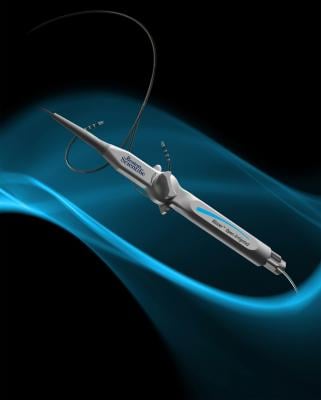
January 21, 2013 — The first patient has been treated in the Boston Scientific Corporation ZERO AF clinical trial to evaluate the safety and effectiveness of the Blazer Open-Irrigated Temperature Ablation Catheter in patients with symptomatic, drug refractory paroxysmal atrial fibrillation. This international, multi-center study will include up to 33 sites in the United States, Europe and Asia-Pacific, and as many as 472 patients. The results of the ZERO AF trial are expected to be used to support a U.S. Food and Drug Administration (FDA) regulatory submission for a paroxysmal atrial fibrillation indication.
Atrial fibrillation is a disorder that disrupts the ability of the heart to beat regularly and pump blood efficiently. It affects approximately 15 million people worldwide and can lead to complications such as stroke or heart failure. Paroxysmal atrial fibrillation is a type of atrial fibrillation in which the irregular heartbeat starts up very quickly, stops spontaneously and abruptly returns to the normal rhythm resulting in patients feeling symptomatic. Catheter ablation, a procedure in which localized electrical energy is delivered into the heart tissue aimed at restoring the continuous normal rhythm, is a common treatment for many heart rhythm disorders including paroxysmal atrial fibrillation.
The Blazer Open-Irrigated Catheter is the latest addition to the extended families of Boston Scientific Blazer catheters. It is the company's first entry into the open-irrigated catheter segment and is approved for use in CE mark countries and Canada. The Blazer Open-Irrigated Catheter offers the Total Tip Cooling design, engineered to consistently cool the entire tip of the electrode during radiofrequency energy delivery.
"The Blazer Open-Irrigated Catheter combines an advanced tip design for irrigated ablation with the reliability of the proven Blazer platform," said Andrea Natale, M.D., executive medical director and principal investigator, Cardiac Electrophysiology, Texas Cardiac Arrhythmia in Austin, Texas.
The first U.S. procedure was performed at St. David's Medical Center in Austin by J. David Burkhardt, M.D., also part of Texas Cardiac Arrhythmia. "As expected, the Blazer Open-Irrigated Catheter handled well, consistent with my previous experience using other Boston Scientific Blazer catheters," said Burkhardt.
"This initiative exemplifies our new mission statement: Boston Scientific is dedicated to transforming lives through innovative medical solutions that improve the health of patients around the world," said Joe Fitzgerald, president of the Cardiac Rhythm Management business at Boston Scientific. "Launching this trial highlights our continued commitment to clinicians and patients through the expansion of our electrophysiology ablation business including the high-growth segment of complex ablations."
Electrophysiology is a 2.5 billion dollar market growing at a double-digit pace and represents a key growth area for Boston Scientific. In the United States, the Blazer Open-Irrigated Catheter is an investigational device and is not available for sale.
For more information, www.bostonscientific.com


 January 05, 2026
January 05, 2026 









